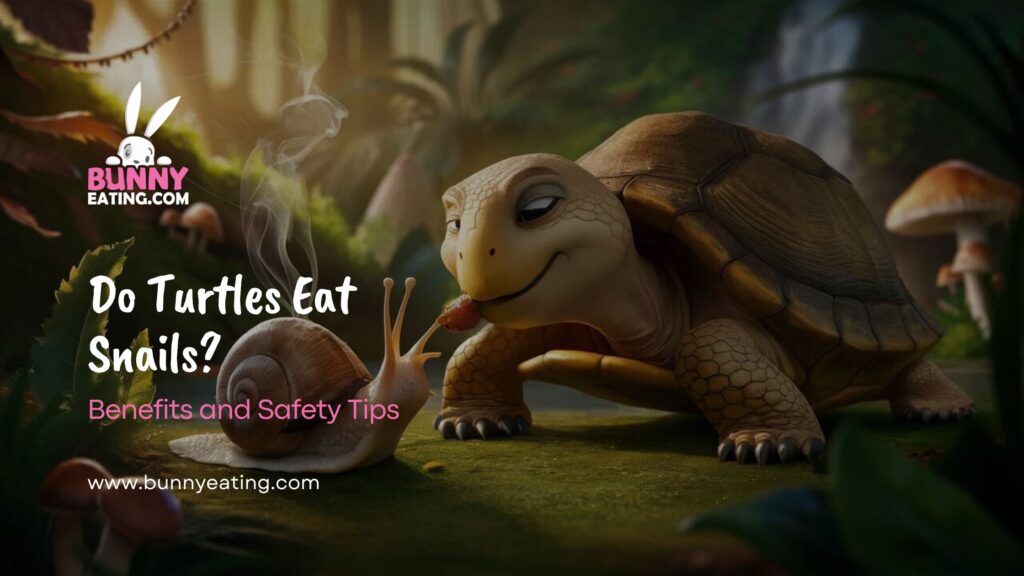Craving crunchy treats? Your turtle might too! While snails are a normal part of a turtle’s diet than they might seem like a perfect food source for your Pet, but are they? Can they be healthy? Read this post to a better understanding on whether it is okay to feed turtles with snails. Let me, then unravel to the readers some of the advantages, what the disadvantage are and how one can be able prepare a balanced diet for the shelled friend.
Do turtles eat snails?
You bet they do!Turtles elevate their food by climbing trees, and frequently feed on snails in the wild. There are numerous species and the majority of them feed on plant and animal matter commonly known as omnivores. Shrimps, octopuses and other sea animals due to their tender and fleshy bodies look appetizing to these animals with shells.
Safe alternatives to feeding snails to turtles?
While snails are a good occasional treat, they shouldn’t be the main course on your turtle’s menu. Here are some safe alternatives:
- Commercial turtle pellets: These provide a balanced diet formulated specifically for your turtle’s needs.
- Leafy greens: Romaine lettuce, collard greens, and dandelion greens are all turtle-friendly options.
- Vegetables: Chopped carrots, sweet potatoes, and green beans can add variety to your turtle’s diet.
- Fruits: Occasional treats of berries, melon, or apples are okay, but fruits should only be a small part of their diet.
- Live fish or insects: These can be offered as a stimulating and nutritious enrichment for your turtle.
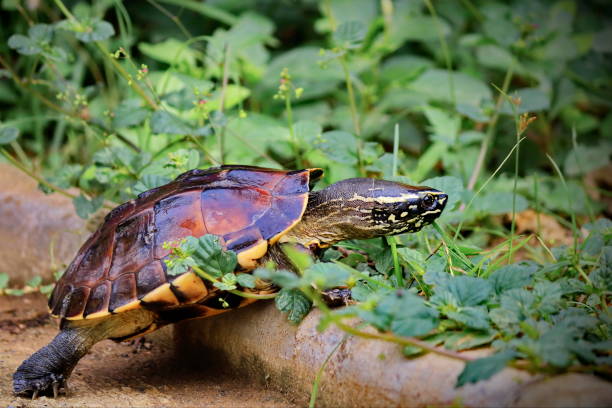
Risks of feeding snails to turtles?
There are a few potential downsides to consider when feeding snails to your turtle:
- Parasites: Wild snails can carry parasites that can harm your turtle. Stick to captive-bred snails or commercially prepared snail snacks.
- Shell fragments: Some snails have hard shells that can be difficult for turtles to digest. Choose soft-bodied snail varieties or crush the shells before feeding.
- Nutritional deficiencies: Snails alone don’t provide all the nutrients your turtle needs. A well-rounded diet is key to keeping your shelled friend healthy.
Effects of eating snails on turtles?
Snails can have both positive and negative effects on turtles, depending on the situation.
- Positives: Snails are a good source of protein and calcium, which are essential nutrients for turtles. They can also be a fun and stimulating food for your turtle to hunt and eat.
- Negatives: Overfeeding snails can lead to nutritional deficiencies if other vital food groups are neglected. Snails with hard shells can cause digestive problems.
Are snails good for turtles?
Snails can be a healthy part of a turtle’s diet but in moderation. Here’s the key: variety! Offer a balanced diet that includes commercial pellets, vegetables, fruits, and occasional treats like snails.
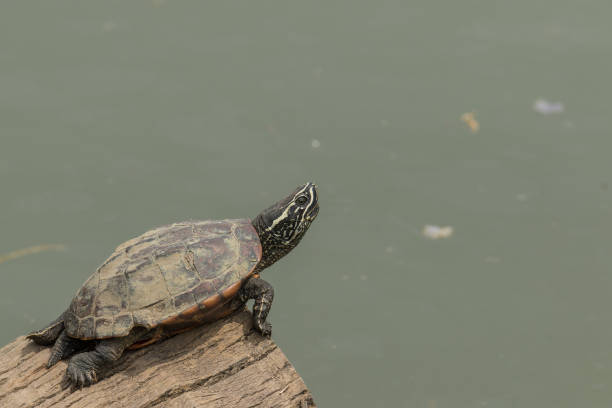
Nutritional Value of Snails for Turtles
Snails offer some essential nutrients for your turtle’s health:
- Protein: Protein is crucial for building and repairing tissues, and snails are a good source of it. This is important for healthy shell growth, muscle development, and overall energy levels.
- Calcium: Calcium is vital for strong bones and a healthy shell. Snails can contribute some calcium to your turtle’s diet, but it’s important to remember they may not provide enough on their own. Consider adding a calcium supplement to their food or tank water.
However, there are some things to keep in mind:
- Limited Variety: Snails are mostly protein and lack other essential nutrients like vitamins A and D. These vitamins are crucial for good vision, healthy skin, and proper calcium absorption. Ensure your turtle gets these from other food sources.
- Shell Issues: While the soft body of a snail is nutritious, the shell can be a problem. Some snail shells are quite hard and can cause digestive issues for turtles. Opt for soft-bodied varieties or crush the shells before feeding.
What Types of Snails Are Safe for Turtles?
Not all snails are created equal! Here are some safe options for your turtle:
- Captive-bred feeder snails: These are the safest option, as they are raised in controlled environments and less likely to carry parasites. Look for varieties like Malaysian trumpet snails or ghost snails at pet stores.
- Aquatic snails: Certain aquatic snail species like bladder snails or ramshorn snails can be tank mates with some turtle species. However, be cautious. While these snails can be a good occasional snack, some turtles may view them as a constant food source and overeat them.
Here’s what to avoid:
- Wild snails: These can harbor parasites harmful to your turtle.
- Land snails: Many land snail species have hard shells that can cause digestive problems.
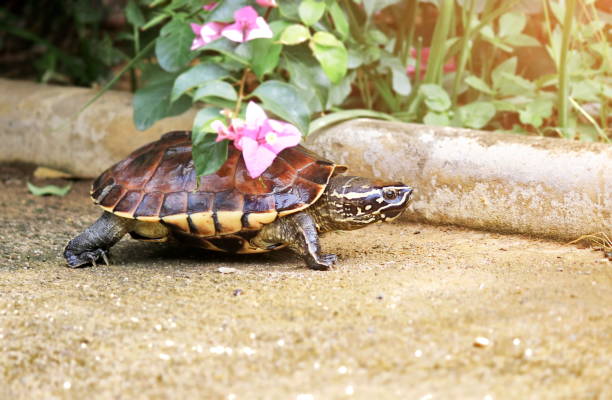
Observing Your Turtles After Eating Snails
After your turtle enjoys a snail snack, keep an eye on them for a while. Here’s what to look for:
- Normal digestion: A healthy turtle should have no trouble passing the digested remains of the snail within 24-48 hours.
- Stool consistency: Their stool should be firm and dark brown. Loose or discolored stool could indicate digestive problems.
- Behavior: Monitor your turtle’s activity level and appetite. If they seem lethargic or lose interest in food, consult a veterinarian.
How Often Can My Turtles Eat Snails?
Since snails aren’t a nutritional powerhouse, they should only be a minor part of your turtle’s diet. Here’s a feeding frequency guideline:
- Adult turtles: As an occasional treat, adult turtles can enjoy a snail 1-2 times a week.
- Baby turtles: Due to their growing needs, baby turtles may benefit from a slightly higher frequency, like 2-3 times a week. But make sure the snails are small enough for them to handle.
Remember, this is just a general guideline. Factors like your turtle’s species, age, and overall health can influence how often they should eat snails. It’s always best to consult your veterinarian for personalized feeding advice.
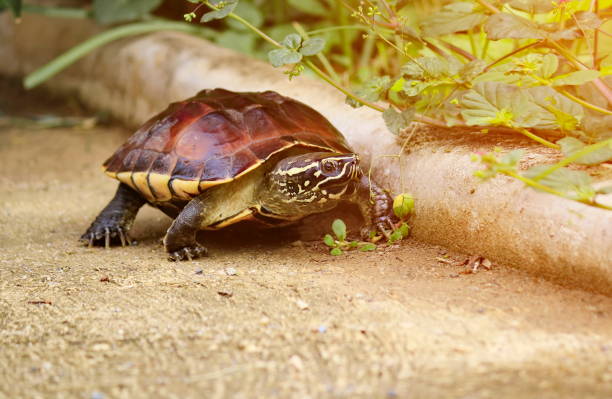
How Much Snails Can My Turtles Eat?
The amount of snail depends on your turtle’s size. Here’s a rule of thumb:
- Adult turtles: The snail should be no larger than the width of your turtle’s shell.
- Baby turtles: The snail should be much smaller than their shell opening to avoid choking hazards.
Important: Even within these size recommendations, be mindful of how much shell your turtle is ingesting. If the snail has a hard shell, crush it slightly before offering it to your turtle.
When Shouldn’t You Feed Snails to Your Turtles?
While snails can be a fun treat, there are times to hold off:
- Sick turtles: If your turtle is unwell, their digestive system may be compromised. Stick to their regular diet and consult a vet before introducing new foods.
- Unidentified snails: If you’re unsure about the type of snail, err on the side of caution and avoid feeding it to your turtle. Stick to commercially bought feeder snails or consult a vet for safe alternatives.
- Turtles with shell problems: If your turtle has existing shell issues, avoid hard-shelled snails that could worsen the problem.
When in doubt, it’s always better to be safe than sorry.
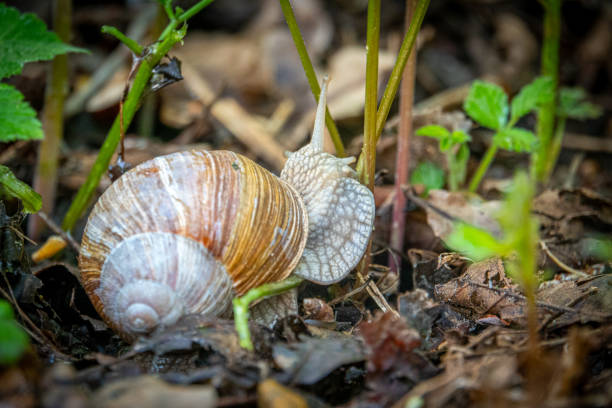
Can Baby Turtles Eat Snails?
Yes, baby turtles can enjoy snails as an occasional treat. However, there are a few extra considerations:
- Snail size: The snail should be much smaller than the baby turtle’s shell opening to prevent choking.
- Frequency: Baby turtles may benefit from a slightly higher snail frequency (2-3 times a week) due to their growth needs. But prioritize a balanced diet with other nutritious foods.
- Supervision: Monitor baby turtles closely when they eat snails, especially if they’re new to this food.
How Frequently Should Adult and Baby Turtles Be Fed Snails?
We covered this earlier, but here’s a quick recap:
- Adults: 1-2 times a week as a treat.
- Babies: 2-3 times a week, but prioritize a balanced diet with other nutritious foods.
Remember, these are general guidelines. Consult your veterinarian for specific advice on your turtle’s dietary needs.
Potential Dangers in Snails
While snails can be a nutritious treat for turtles, there are a few potential dangers to be aware of:
- Parasites: Wild snails can harbor parasites that can make your turtle sick. Stick to captive-bred feeder snails or commercially prepared snail snacks to minimize this risk.
- Shell fragments: Some snail species have hard shells that can be difficult for turtles to digest. This can lead to constipation, impaction (blockage in the digestive system), or even internal injuries. Choose soft-bodied snail varieties or crush the shells before feeding, especially for young turtles.
- Nutritional deficiencies: A diet consisting mainly of snails can lead to nutritional deficiencies. Snails lack essential vitamins and minerals that your turtle needs to stay healthy. Offer a well-rounded diet that includes commercial pellets, vegetables, and occasional treats like snails.
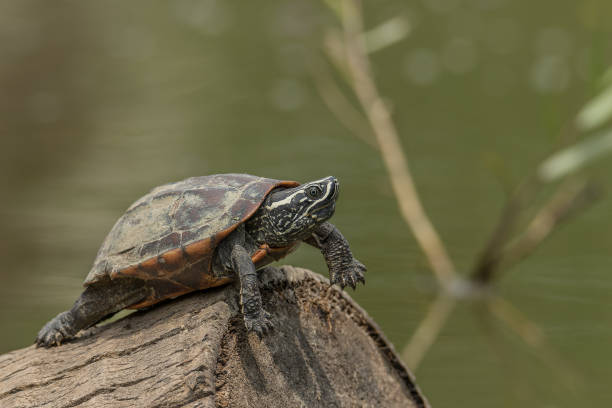
Monitoring Your Turtle’s Health After Eating Snails
After your turtle enjoys a snail snack, keep an eye on them for the next day or two. Here are some signs to watch for:
- Digestion: A healthy turtle should pass the digested remains of the snail within 24-48 hours.
- Stool: Their stool should be firm and dark brown. Loose, discoloured stool or a lack of bowel movements could indicate digestive problems.
- Behaviour: Monitor your turtle’s activity level and appetite. If they seem lethargic, lose interest in food, or show any signs of discomfort, consult a veterinarian.
Early detection and treatment are crucial for your turtle’s health. If you notice any concerning signs, err on the side of caution and seek professional help.
Incorporating Fresh Greens and Vegetables
A balanced diet is key to keeping your turtle healthy and happy. Here are some fresh greens and vegetables you can incorporate alongside occasional snail treats:
- Leafy greens: Romaine lettuce, collard greens, dandelion greens, and mustard greens are all excellent choices.
- Vegetables: Chopped carrots, sweet potatoes, green beans, and butternut squash offer essential vitamins and minerals.
- Fruits: Occasional treats of berries, melon, or apples are okay, but remember, fruits should only be a small part of their diet.
These fresh foods provide a variety of nutrients that snails lack, ensuring your turtle gets everything they need to thrive.
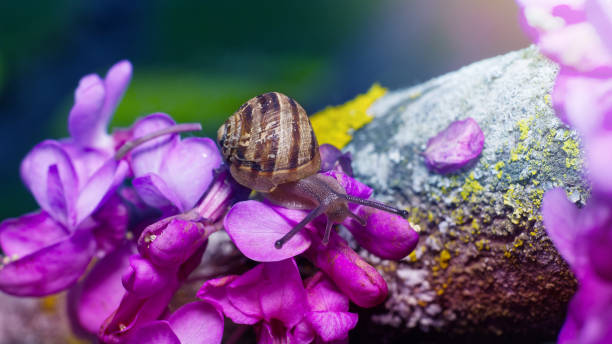
Creating a Balanced Diet With Snails
As we’ve learned, snails can be a fun and nutritious occasional treat for your turtle, but they shouldn’t be the star of the show. Here’s how to create a balanced diet that incorporates snails while providing all the essential nutrients your turtle needs:
The Base:
- Commercial turtle pellets: These should form the foundation of your turtle’s diet. Look for pellets formulated for your turtle’s species and age group. These pellets are packed with essential vitamins, minerals, and protein to support overall health.
The Veggies:
-
Daily dose of greens: Offer a daily helping of chopped leafy greens like romaine lettuce, collard greens, or dandelion greens. These provide important vitamins A and C, calcium, and fibre for a healthy digestive system.
-
Variety is key: Rotate different vegetables throughout the week. Chopped carrots, sweet potatoes, green beans, and butternut squash are all excellent choices. These offer a wider range of vitamins, minerals, and antioxidants.
The Treats:
-
Fruits for a touch of sweetness: An occasional treat of berries, melon, or apples is okay, but limit fruits due to their high sugar content.
-
Snails as occasional protein boost: Stick to the recommended frequency (1-2 times a week for adults, 2-3 times for babies) and ensure the snails are the appropriate size for your turtle. captive-bred feeder snails or crushed soft-bodied varieties are the safest options.
Remember:
- Portion control is key: Don’t overfeed your turtle, regardless of the food.
- Freshwater is essential: Provide a clean and readily available source of fresh water for your turtle to stay hydrated.
- Consult your vet: If you have any concerns about your turtle’s diet or health, consult your veterinarian for personalized advice.
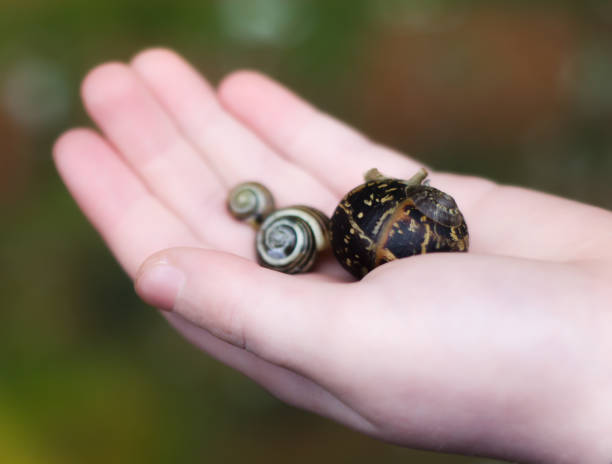
My Turtles Ate a Whole Snails!
It happens! Even with careful monitoring, your turtle might devour a whole snail, especially if it is on the larger side. Here’s what to do:
- Monitor closely: Watch your turtle’s behaviour over the next few days. Look for signs of digestive issues like lethargy, loss of appetite, or loose stool.
- Reduce snail frequency: For the next week or so, hold off on feeding them any more snails. Their digestive system may be busy processing the larger meal.
- Offer plenty of greens: Fiber-rich greens like romaine lettuce or collard greens can aid digestion.
- Hydration is key: Ensure your turtle has constant access to clean, fresh water.
- Seek vet advice if concerned: If you notice any worrying signs or your turtle seems uncomfortable, don’t hesitate to consult a veterinarian. Early intervention is crucial for their health.
Can Turtles Eat Wild Snails?
While tempting, it’s generally not recommended to feed your turtle wild snails. Here’s why:
- Parasite risk: Wild snails can harbour parasites that can be harmful to your turtle. Stick to captive-bred feeder snails or commercially prepared snail snacks to minimize this risk.
- Pesticide exposure: Wild snails may have been exposed to pesticides or other harmful chemicals in their environment. These can be toxic to your turtle.
- Unidentified species: You might not be able to accurately identify the type of snail. Some wild snail species have very hard shells that can cause digestive problems for turtles.
Playing it safe is the best approach. Opt for commercially available feeder snails or consult your vet for safe alternatives.
What Else Can I Feed My Turtles Besides Snails?
A well-rounded turtle diet goes beyond snails! Here are some excellent options to consider:
- Commercial turtle pellets: These should be the foundation of your turtle’s diet. Choose high-quality pellets formulated for your turtle’s species and age.
- Leafy greens: Daily servings of romaine lettuce, collard greens, or dandelion greens provide essential vitamins and fibre.
- Vegetables: Rotate chopped carrots, sweet potatoes, green beans, and butternut squash throughout the week for a wider range of nutrients.
- Fruits (limited): Occasional treats of berries, melon, or apples are okay, but remember, fruits are high in sugar.
- Live fish or insects: These can be offered as a stimulating and nutritious enrichment for your turtle, but ensure they are the appropriate size and type for your turtle’s species.
By providing a variety of these foods, you can ensure your turtle gets all the essential nutrients they need to thrive.
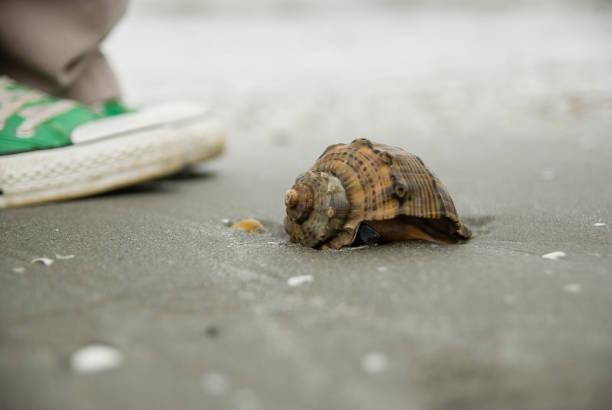
How to Create a Turtles-Friendly Garden
If you’re feeling adventurous, you can create a safe outdoor haven for your turtle that provides them with some natural grazing opportunities. Here’s how to make a turtle-friendly garden:
-
Enclosure matters: Ensure your garden is securely enclosed to prevent escapes or unwanted predators. Use fencing that goes underground to deter burrowing animals.
-
Sun and shade balance: Provide a mix of sunny and shaded areas. Turtles need sunlight for vitamin D synthesis, but they also need cool, shady spots to retreat from the heat.
-
Plant variety: Choose safe, turtle-approved plants. Here are some excellent options:
- Leafy greens: Dandelion greens, collard greens, and hibiscus leaves are all turtle favourites.
- Vegetables: Nasturtiums, squash vines, and bean sprouts are safe and nutritious choices.
- Fruits: Strawberry plants can provide a sweet treat, but limit access to avoid overconsumption.
-
Keep it shallow: Avoid deep ponds or water features. Turtles are not strong swimmers, and shallow wading areas are sufficient.
-
Hiding spots: Provide plenty of hiding spots for your turtle to feel secure. Rocks, logs, and overturned flower pots can work well.
-
Natural filtration: If you have a small pond, consider adding live plants that help filter the water naturally.
Remember:
- Monitor closely: Always supervise your turtle when they’re outdoors.
- Remove toxic plants: Research and remove any plants that might be toxic to turtles.
- Control the environment: Be mindful of potential hazards like pesticides or fertilizers that could harm your turtle.
A turtle-friendly garden can be a fun and enriching way to provide your turtle with a natural source of food and exercise.
Turtle Treats Made at Home with Snails
While the idea of homemade treats might seem appealing, it’s generally not recommended to use snails as an ingredient. Here’s why:
- Safety concerns: Even if you use captive-bred snails, there’s a risk of introducing harmful bacteria during preparation.
- Nutritional imbalance: Homemade treats are unlikely to provide a balanced range of nutrients your turtle needs.
- Commercial options available: There are commercially available turtle treats formulated to be safe and nutritious.
A better alternative:
- Frozen treats: You can create healthy frozen treats for your turtle by freezing a mixture of chopped vegetables and fruits in water. This provides enrichment and hydration while offering some essential vitamins.
Always remember:
- Consult your vet: Before introducing any new food items, consult your veterinarian for guidance specific to your turtle’s needs.
- Focus on a balanced diet: Stick to a well-rounded diet of commercial pellets, vegetables, and occasional treats to ensure your turtle gets all the nutrients they need to thrive.
Conclusion
Therefore, while snails may be entertaining and nutritious as treats that can be given to the turtle now and then, they cannot be the primary diet. With these tips in mind, a balance diet with inclusion of snails for your turtle can be prepared without having to compromise on the health requirements of your pet turtle. Please don’t forget that a happy and healthy turtle is an active one, and a little variance in diet is a very good thing.
FAQs Snails and Your Turtle’s Diet
Q Can turtles eat snails?
A: Yes, turtles can eat snails as an occasional treat. Snails offer some protein and calcium, but a balanced diet is key.
Q How often can I feed my turtle snails?
A: Adults: 1-2 times a week. Babies: 2-3 times a week, but prioritize a balanced diet with other foods.
Q What kind of snails are safe for turtles?
A: Captive-bred feeder snails or crushed soft-bodied varieties are safest. Avoid wild snails due to parasite risk.
Q What to look for after my turtle eats a snail?
A: Normal digestion within 24-48 hours, firm dark stool, and normal activity level. If you see any concerning signs, consult a vet.
Q Can turtles eat snail shells?
A: It’s best to avoid hard shells. They can cause digestive issues. Opt for soft-bodied snails or crush shells before feeding.

